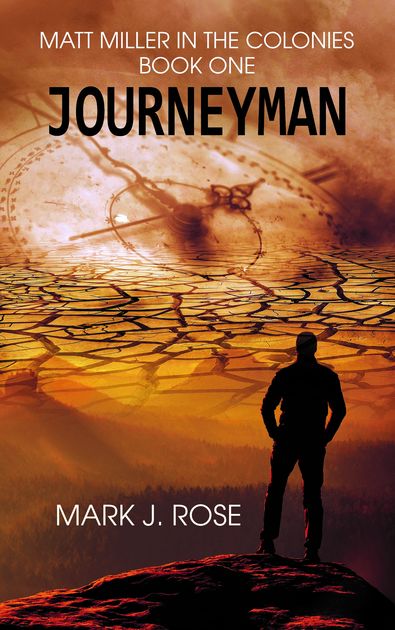An insight into the motivation behind the all-American book, Journeyman.
Mark Rose, author of Journeyman, has a fascination with the challenges humanity faces as technology rapidly evolves and interacts with science and society. Rose goes back to a simpler time – colonial America – to take a look at America’s beginnings and the people who helped build our nation. During a tumultuous time in present-day American politics, Journeyman paints a refreshingly optimistic picture of America’s future using the colors of its past. Just in time for the 4th of July!
Mark Rose is the author of the new series Matt Miller in the Colonies. Journeyman, book one of the two book series, tells the tale of a 21st century man who time travels to colonial America only to find himself trapped, unable to return home. Now he must learn the skills required to survive in the new world as he gains the trust and friendship of his colonial brethren.
Q. Your genre, time travel/sci-fi, is popular right now, why do you think that is?
A. We are all fascinated with having the power to travel back in time and fix our mistakes, or to know the future so that we can prepare. Humans are the only creatures on the planet that sense time. As a scientist, I believe there is more to time than just its tendency to pass, and that our minds are just on the very edge of comprehending this other dimension. When humans sense that something is possible, they usually find a way to make it happen. We will eventually master time travel because we’re motivated by a deep emotional need. Until then, we’ll live our time-travel fantasies through good stories.
Q. What is something interesting/cool/unbelievable you discovered while researching your book?
A. There are a number of phrases that we use today that have their origin in colonial times. One example is the phrase “saved by the bell.” I always thought this had something to do with modern boxing, but it actually comes from the fact that people were sometimes accidently buried alive in the eighteenth century. Because of this, they began tying a string to people’s wrists before they were buried and they would run the string to a bell on the ground of the cemetery. If you woke up in your coffin and pulled the string, you were known as a “dead ringer.” The people they hired to sit in the cemetery and listen for ringing bells worked the “graveyard shift.” Their job, then, would be to dig you up as quickly as possible. That’s cool stuff.
Q. What is the core message you want to deliver to the world through your writing/books/stories?
A. I want people to resist the temptation to try to judge colonial Americans based on the standards of today. These were good people and they were very progressive for their time in history. Colonial Americans created a system of government that hasn’t been fundamentally improved since the writing of the Constitution in 1787. Granted, it took a while for us to realize their dream of equal rights for everyone and we may still not be there, but that shouldn’t detract from their legacy. The United States has pulled more people out of poverty and tyranny than any society in the history of the world, and we owe it all to colonial America. Our first feeling towards our founders should be awe, plain and simple.
Q. What book haven’t you read that you know you must?
A. I’m halfway through “Crime and Punishment.” I set it down and never finished. Also, I bought a copy of “The Origins and History of Consciousness” by Erich Neumann. He was a student of Carl Jung. I’m hoping both books will help me sort out human emotion and motivation. I’d like to use this information in my writing as well as a way to help me understand the increasing negativity in US politics. We live in the greatest society the world has ever seen and have historically low poverty rates, yet it feels like we’ve become more and more miserable. What does it take for a society to be optimistic and happy?
Q. What advice do you have for other writers?
A. 1. Plan a time to write and then sit there and write, whether you feel like it or not. I’ve heard a number of successful writers say that they’ve done their best work in those times when they have felt the least inspired.
- There is no good writing, only good rewriting. It’s a lot more fun, too.
Rapid Fire Questions and Answers
Q. Guardians of the Galaxy or XMen?
A. Guardians of the Galaxy
Q. The beach or the mountains?
A. Mountains
Q. Zombies or aliens?
A. Zombies
Q. Sponge Bob Square Pants or Bugs Bunny?
A. Bugs Bunny
Q. Coachella or Broadway?
A. Coachella
Q. Chess or Candy Crush?
A. Chess
Q. Invisibility or mind reading?
A. Invisibility
Q. London or Istanbul?
A. London
Q. Hippies or hipsters?
A. Hippies
Q. Reading or writing?
A. Writing

